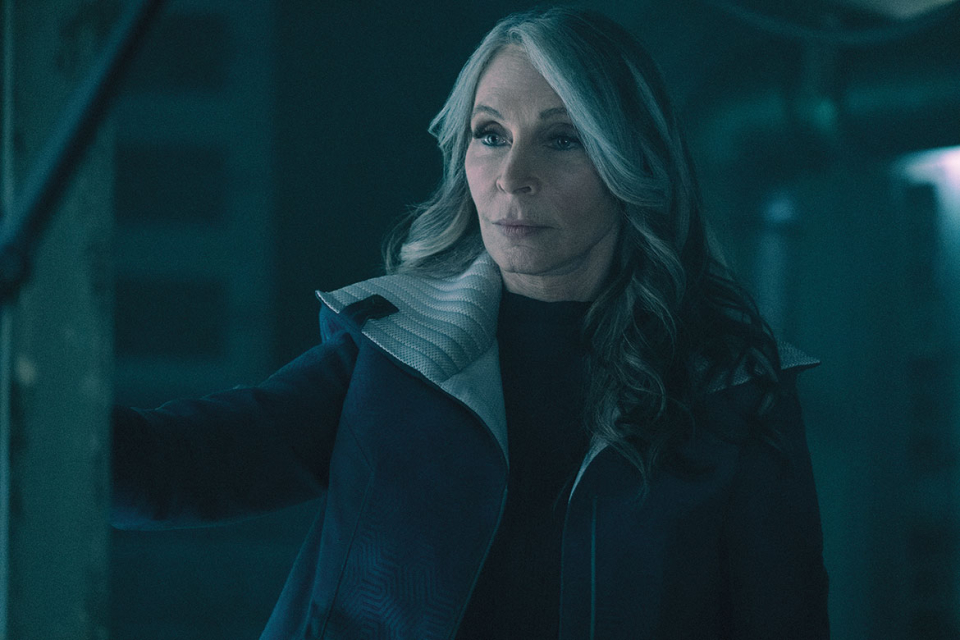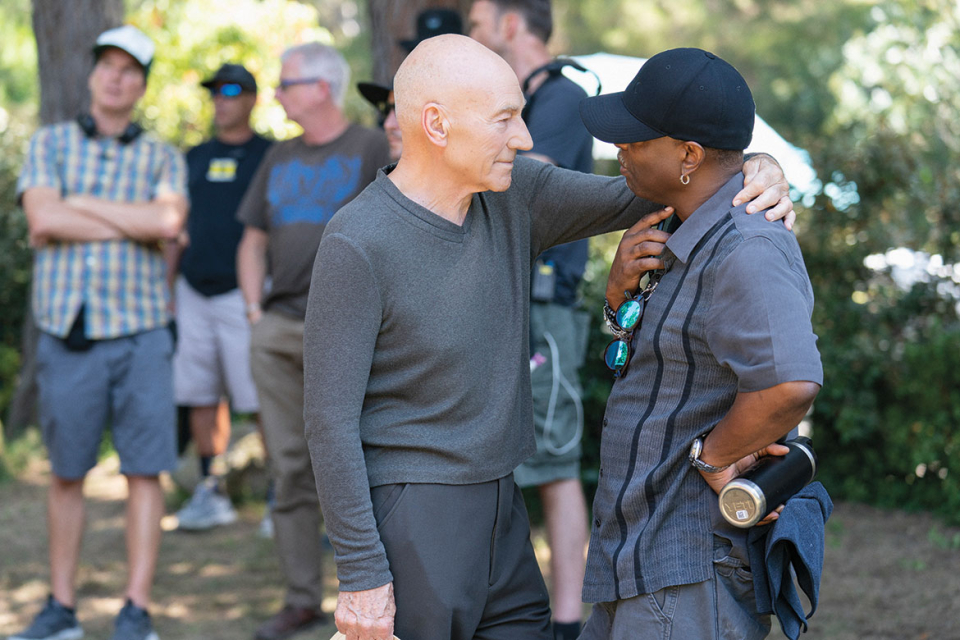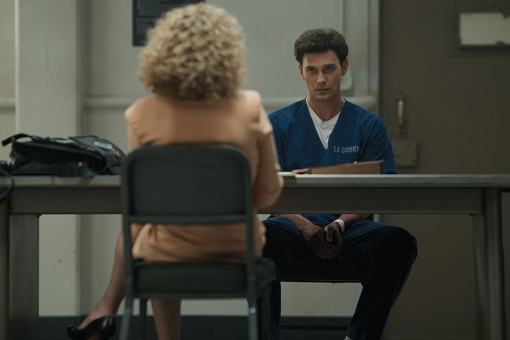One evening, more than 15 years ago, Patrick Stewart and his wife-to-be Sunny Ozell were flipping channels, looking for a movie to watch over dinner. When they landed on Star Trek: Nemesis, the couple decided to make it their maiden Trek together. To Stewart's surprise, the viewing brought him to tears. Not because of the plot, but because it was the last movie to feature the cast of Star Trek: The Next Generation.
Toward the end of the film, Captain Jean-Luc Picard (played by Stewart) gathers with his crew — Dr. Beverly Crusher (Gates McFadden), Lieutenant Commander Worf (Michael Dorn), Lieutenant Commander Geordi La Forge (LeVar Burton), Commander Will Riker (Jonathan Frakes) and Counselor Deanna Troi (Marina Sirtris) — to drink a toast to what remains of their work "family."
As a viewer, Stewart was especially touched when Riker — the stalwart first officer who had finally been given his own command — saluted his longtime leader. "Riker says, 'Serving with you has been an honor,' and Picard says, 'The honor was mine,'" Stewart recalls. "When I saw that, it expressed my feelings about Jonathan."
But to understand Stewart's tears, you need to know that this cast had never truly said goodbye to one another. "We're like the cast of Friends," Frakes says. "We've been at each other's weddings. We have dinners together. We check in on each other constantly."
But their characters, of course, did have to say goodbye — more than once. They did so in the TNG series finale in 1994, in what Terry Matalas, an executive producer of Star Trek: Picard, calls "the perfect send-off." And they did it four more times, in a string of feature films: Star Trek: Generations (1994), First Contact (1996), Insurrection (1998) and Nemesis (2002).
Of course, many more Star Trek series followed in TNG's wake — Deep Space Nine, Voyager, Enterprise, Discovery, Lower Decks, Prodigy and most recently, Strange New Worlds — but none featured the full TNG ensemble.
Still, viewers craved more TNG stories, and they made that clear to Stewart when they stopped him on the street. Fans who'd been following Picard since the debut TNG episode, "Encounter at Farpoint," in 1987 were eager to explain their feelings for the series. "It's a powerfully successful and much-loved piece of entertainment," Stewart says of the show, which ran for seven seasons. "And Picard became a symbol of hope that there could be a better world."
Even so, the Shakespearean actor — who was knighted by Queen Elizabeth II for his services to the dramatic arts — had some reluctance when showrunner (and acclaimed novelist) Michael Chabon asked him to beam aboard Star Trek: Picard. The new series — the eighth in the franchise — called for Stewart to reprise his role, but at a later age, as a retired Starfleet admiral living on his family's vineyard.
Chabon assured the star that Picard's life would have changed significantly since those wistful goodbyes on Nemesis. "That gave me the inspiration to take on three more seasons of being Jean-Luc," says Stewart, who also took on a position as executive producer. "It was always important for me that we should look at aspects of Picard's nature that we hadn't really examined in the 170-odd episodes of The Next Generation."
So Star Trek: Picard was launched in 2020 on CBS All Access, with Picard facing life in 2399, twenty years post-Nemesis. The third and final season is now under way on Paramount+, where its ten-episode run debuted February 16; the first two seasons are also available on the streamer.
This revival of Picard has broken new ground, offering a deeper understanding of the man, deconstructing his character as well as his status as a symbol of hope. As viewers of the first two seasons know, he remains mentally sharp, but he has found himself newly vulnerable in his retirement years, without Starfleet to back his endeavors or rescue missions.
"Where is Picard now?" Frakes asks, by way of explanation. "He's a mysterious, intellectual, philosophical vintner, still haunted by demons of his past. There is so much going on with Picard that has nothing to do with the Enterprise. That's what fed the first two seasons of the show."
The spirit of Star Trek: Picard, though, is very different in season three, and that can be attributed, in part, to the changing of the guard. (Following Chabon's tenure as showrunner in season one, Akiva Goldsman took command of season two; season three is steered by Terry Matalas.)
With the theme of legacy in mind, Matalas felt the cast of The Next Generation needed to return to Picard's side in force in the final season. Fans had already witnessed some reunions: Brent Spiner, for example, returned in Picard's first season as the android Data and also appeared as two members of the Soong family. And, in one of the best episodes of season one, Picard reunited with Frakes (as Riker) and Sirtis (as Troi) in their warm family home on the planet Nepenthe, where they live with their daughter Kestra, and Riker makes pizza for dinner.
In fact, legacy castmates Dorn and Burton visited the set during the filming of that episode, and became so giddy about being together again, they had to be told to pipe down. It was just like old times, Dorn says, explaining, "Every day was like a frat house."
Picard season three isn't intended to be a final TNG season, however. For one thing, the styles of storytelling are light years apart. TNG was a procedural, with a new adventure every week, while Picard is serialized, closer in tone to a Star Trek feature film. Also, Picard could wrap up many of the arcs of TNG, drawing from a deep well of unresolved conflicts and relationship dynamics.
"That's the beauty of telling a story that's thirty-five years long," Matalas says. "And that's the way I approached the third season. If we were going to tell one last story, what hasn't been told? What's the last relationship?"
(Spoiler alert: season-three plot points ahead.)
Like many Trek captains before and after him, Picard had not been a family man. In his ninety-plus years, the character had never had a life partner nor children. (And before rumors resurface, Wesley Crusher — played by Wil Wheaton in TNG — was not Picard's son, McFadden notes.) Picard was always uncomfortable with children — often a comedic point on TNG — but he did serve as a father figure for the Enterprise crew and, to some extent, for the audience as well.
The series and films occasionally indulged in Picard fatherhood fantasies, offering ready-made offspring (as in season five of TNG and the film Generations) or a case of mistaken identity (TNG, season seven). But these were always fake-outs. Picard never had to fully address his desire for family or face the impossible decision of choosing between his child and his crew.
Matalas's game-changing proposal was to give Picard an adult child — a real one, this time — and to involve both in a dangerous adventure. Fatherhood, the final frontier.
"I went to Patrick Stewart," the showrunner recounts, "and said, 'What if Picard had a son he didn't know about?'" And there was more: a revelation that the son's mother was Picard's former colleague, close friend and unrequited love, Beverly Crusher. Matalas didn't suggest this latter scenario — Stewart beat him to it. "What if it was with Beverly?" he asked.
"It always felt like unfinished business between them," Stewart observes. "I had been uneasy at the idea of a sentimental family story. But of course, it was more complex than that, as these things invariably are in life. The idea was in a context I felt I could support."
Before agreeing to return to her role, McFadden wanted to make sure that Crusher had good reasons for keeping her son a secret. Matalas assured her, and he believes viewers will be on her side. "You won't be like, 'God, she's a monster,'" he says. "You'll say, 'Beverly was right all along.'" Plus, as seen in episode one of the new season, Crusher has had an extremely busy life away from Starfleet, working with an intergalactic Doctors Without Borders operation.
"I like that she's a humanitarian," McFadden says. "And I like that she's fierce."
The late Gene Roddenberry, creator of Star Trek, had many rules for his universe. And even though one of his inspirations was Horatio Hornblower, C.S. Forester's swashbuckling British naval officer, Roddenberry insisted that there be no pirates in space. Star Trek: Picard nearly breaks that rule with the addition of Jack Crusher (Ed Speleers) as the surprise son. Jack isn't an outright pirate, but he doesn't shy away from violence when confronting the rangers and gangsters who try to disrupt the medical supply missions he conducts with his mother.
"Picard himself had been established as a bit of a hothead in his youth," Matalas says. "So we liked the idea that if Jack didn't have Starfleet, he might be even more like that."
Stewart believes the big reveal provided him with some of the very best scenes he's ever shot with his TNG colleagues. Frakes, who shares one of them, concurs.
"Patrick Stewart is one of our finest actors, and he's been overlooked [when it comes to awards recognition]. It's one of the curses of the science-fiction genre." The wordless exchange between Picard and Beverly Crusher that confirms everything is "so brilliant," Frakes says. "It's chilling. It's powerful. It's clean. It's simple. And it's beautifully acted."
As Picard the series has progressed, Picard the character has grown more turbulent. But this development brings him to a new intensity, expressing rage, disappointment and betrayal. "He loses control of himself at one point," Stewart notes. "I don't think he has ever been this angry."
But even more than the shocking Picard reveal, Matalas was nervous about pitching the final Geordi La Forge story to LeVar Burton. "When I explained the kinds of things we'd see Geordi do, he started to cry," Matalas says. "That he was so moved by it made me cry."
As for another key character, Matalas saw Worf moving into Starfleet Intelligence, and he was happily surprised when his alter ego, Dorn, turned out to be on the same page.
"I see Worf being out there on his own," Dorn told Matalas. "He's a bit of a loner."
"That's funny," Matalas responded. "We see him as a sort of samurai, working with — but outside of — Starfleet."
Dorn was hoping Worf would take a spiritual journey, blending his Starfleet and Klingon identities, and "try to find himself, where he belongs, how he fits into this world." (Surprise: warrior Worf now considers himself a pacifist.)
Neither Matalas nor Brent Spiner wanted the actor to return as Data or yet another Soong family member. Instead, Matalas pitched Spiner another idea — bringing back Data's "evil twin" android brother Lore, to explore how Lore is "almost a bastard child, a rejected child," which ties back into the season's theme of legacy.
Frakes — who, in addition to playing Riker, directed two episodes of the new season — notes that Matalas took the time to collaborate with everyone, rewriting storylines to work in many legacy cast members.
"It was exhausting, but it was worth it," Frakes says. "These weren't twenty-minute chats, but hours and hours. And Terry delivered the most exciting and ambitious season of Trek in decades, in terms of the density of character and the emotionality. Thank God for some of the levity that he infused into it!"
Looking back on thirty-five years of storytelling, you have to wonder, was The Next Generation crew accorded favored status by Starfleet? Would Picard — after being assimilated by the aliens of the Borg and taking part in a battle in which thousands were killed — even be allowed back into service, let alone promoted to admiral? Haven't his crews crashed a number of ships?
From one perspective, yes, these officers are legends who saved the galaxy multiple times. From another, though — such as that of U.S.S. Titan captain Liam Shaw (Todd Stashwick), who has "a bit of an 'Okay, Boomer' point of view," Matalas says — these icons have been acting more than a little irresponsible and entitled, expecting strangers to risk their lives for them yet again.
"The new perspectives on their legacies shine a light on how '90s storytelling worked," Matalas says, "versus where we are now in streaming. We can address those things in really interesting ways, because the world has changed and television has changed."
Still, the question lingers: Is this really the final voyage? It is definitely the final season of Star Trek: Picard — but the TNG crew doesn't seem ready to say goodbye. Stewart, for one, is keen to do another TNG–centric feature film or series.
"I'm not entirely sure that we said everything by the end of season three of Picard," he muses. "The last episode is terrific — it's full of love and affection and joy and respect. But there remain unanswered questions, and it might be a good idea to look at Jean-Luc Picard one more time in a different atmosphere, and then wrap him up with certainty."
If not more Picard outright, what about making way for a next Next Generation? Frakes imagines a ship where the characters of Picard would serve together (and with the family ties, there would be ample room for more legacy appearances): Jeri Ryan's Seven of Nine as the captain, Michelle Hurd's Raffi as first officer, Jack Crusher on the bridge, Geordi's daughter Sydney "Crash" La Forge at the helm and Riker and Troi's daughter Kestra graduating from Starfleet Academy.
"I could be like Charlie in Charlie's Angels, the admiral they check in with," Frakes suggests.
A Picard-Crusher, a Riker-Troi and a La Forge serving together? Make it so!
The executive producers of season three of Star Trek: Picard include Alex Kurtzman, Akiva Goldsman, Terry Matalas, Patrick Stewart, Heather Kadin, Aaron Baiers, Rod Roddenberry, Trevor Roth, Doug Aarniokoski and Dylan Massin. The series is produced by CBS Studios in association with Secret Hideout and Roddenberry Entertainment.
This article originally appeared in emmy magazine issue #1, 2023, under the title, "What He Leaves Behind."
















